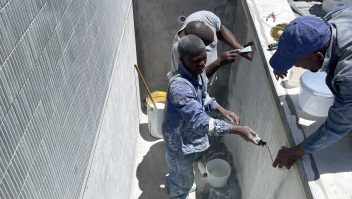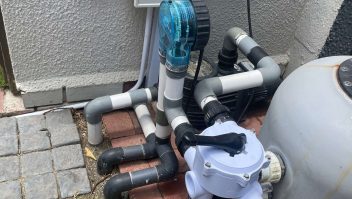When it comes to pool water balance, the Saturation Index (also known as the Langelier Saturation Index or LSI) plays a crucial role in keeping your swimming pool water safe, clear, and corrosion-free. In this guide, we’ll explain what the Saturation Index is, how to use a pool Saturation Index calculator, and why it’s important for pool owners in South Africa—especially in places like Cape Town where water quality can vary.
What Is the Saturation Index?
The Saturation Index is a formula used to determine whether your pool water is balanced, corrosive, or scale-forming. A perfectly balanced LSI is 0.0, while:
- Negative values (< 0) indicate corrosive water.
- Positive values (> 0) suggest the water is scale-forming.
Unbalanced water can damage your pool finish, corrode metal fixtures, or lead to cloudy water and scale buildup in your equipment.
How to Calculate the Saturation Index
The LSI formula factors in:
- pH
- Calcium Hardness
- Total Alkalinity
- Cyanuric Acid (stabilizer)
- Temperature (in °C)
A handy Pool Saturation Index Calculator takes these inputs and gives you a result in seconds. You can try this external calculator or speak to a local Cape Town pool professional for a water test.
Saturation Index Formula:
LSI = pH + TF + CF + AF - 12.1
Where:
- TF = Temperature Factor
- CF = Calcium Factor
- AF = Alkalinity Factor
Why Is LSI Important?
Maintaining proper saturation levels:
- Prevents corrosion of pool plumbing and equipment
- Stops scale buildup on tiles and walls
- Protects pool surfaces like plaster, gunite, or fibreglass
- Helps chlorine work more efficiently
Tips for Balancing Your Pool’s LSI
- Test Weekly: Use a digital test kit or take a sample to your local pool shop.
- Adjust in Steps: Don’t try to fix everything at once. Focus on pH and alkalinity first.
- Use the Right Chemicals: Choose calcium chloride, sodium bicarbonate, muriatic acid, or soda ash based on your pool’s needs.
- Seasonal Adjustments: In colder months in Cape Town, water temperature can lower the LSI, so you may need to adjust calcium or alkalinity.
Internal Links:
- Pool pH Calculator: How to Get Your pH Level in Range
- Calcium Hardness Calculator: How Much Calcium Chloride to Add
- Pool Alkalinity Calculator: What to Add & How Much
- Pool Maintenance Tips for Cape Town Pools
External Links:
FAQ: Pool Saturation Index
1. What is a good LSI number for my pool?
A value between -0.3 and +0.3 is generally considered acceptable, with 0.0 being perfectly balanced.
2. What happens if the Saturation Index is too low?
Low LSI means corrosive water, which can damage your pool surface, heater, and metal fixtures.
3. How often should I test for LSI?
Test weekly during summer and every two weeks during winter, especially if you’re adding new water or chemicals.
4. Can I balance my pool water without a calculator?
Yes, but it’s tricky. A calculator simplifies the math and avoids human error—especially useful for beginners.
5. Does the Saturation Index change with temperature?
Yes. Colder water decreases the LSI, making it more corrosive. Warmer water raises the LSI, potentially causing scale.
By understanding and controlling your pool’s Saturation Index, you can extend the life of your pool, protect your equipment, and ensure a safe, sparkling swim year-round.
Ready to calculate your LSI? Try a free online pool calculator or ask Pools Reno to test and balance your pool water for you in Cape Town and the Western Cape.
Post 2: Pool Stabilizer Calculator: How Much to Add?



